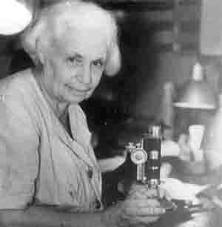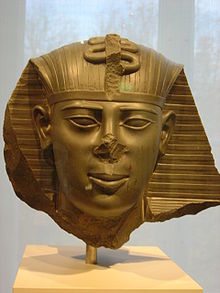Zhirov
Klenova, M.V. (t)
 Maria Vasilyevna Klenova (1898-1976) was another Russian marine geologist cited by Zhirov as expressing the view, in 1948, that Atlantis had been located on a huge continental block in the region of the Azores, Canary and Cape Verde Islands.
Maria Vasilyevna Klenova (1898-1976) was another Russian marine geologist cited by Zhirov as expressing the view, in 1948, that Atlantis had been located on a huge continental block in the region of the Azores, Canary and Cape Verde Islands.
Amasis
Amasis II, was the Greek name of Ahmose who reigned from 570-526 BC. Amasis is given by Plato as the  name of the Egyptian pharaoh at the time of Solon’s visit to Sais. However, Phyllis Young Forsyth[266.38] protests that Plato did not claim that Amasis was on the throne at the time of Solon’s visit, but merely identified Sais as the home of Amasis. The English translations of Tim.21e by Bury, Jowett and Lee are compatible with this, as is the German translation of Plato’s text by Franz Susemihl(a). John Michael Greer[0345], among others, supports this view.
name of the Egyptian pharaoh at the time of Solon’s visit to Sais. However, Phyllis Young Forsyth[266.38] protests that Plato did not claim that Amasis was on the throne at the time of Solon’s visit, but merely identified Sais as the home of Amasis. The English translations of Tim.21e by Bury, Jowett and Lee are compatible with this, as is the German translation of Plato’s text by Franz Susemihl(a). John Michael Greer[0345], among others, supports this view.
Firm historical information for this period is often scanty and sometimes contradictory. However, it is thought that Solon left Athens for a number of years and some of that period may have overlapped with part of Amasis’ reign. Herodotus is our principal source of information regarding Amasis and he clearly mentions (Bk.1.30) that Solon was at the court of Amasis. Zhirov quotes the views of V.S. Struve, who believed that Herodotus’ 3rd century BC dates were out by 25 years.
Ivan Linforth strongly disputes[041.300] the idea of Solon meeting Amasis as “chronologically quite improbable”. He claims that Solon (c.630-560 BC) had returned to Athens before the reign of Amasis. John Michael Greer[0345.15], not very convincingly, attempts to counter this idea with the suggestion that at the time of Solon’s visit, Amasis had not yet ascended the throne.
A more recent refutation of the claim that Plato’s reference to Amasis is an anachronism is offered by Diego Ratti(b).
(a) https://web.archive.org/web/20180901011839/https://atlantis-schoppe.de/susemihl.pdf
(b) Solon and anachronism issue (archive.org)
Phaeacia
Phaeacia was a land described by Homer in his epic poem Odyssey, which is usually equated with the legendary island of Scheria, identified by many with Atlantis. .
Ignatius Donnelly was probably the first to suggest a linkage between Phaeacia and Atlantis. Jürgen Spanuth as well as Hennig and Kluge shared this view of Donnelly‘s, Based on Hennig’s work Spanuth listed 32 items of similarity between Phaeacia and Atlantis in his Atlantis – The Mystery Unravelled[017.143] and Atlantis of the North[015.218]. However, N. Zhirov remarked that an equally long list of discrepancies could also be compiled, leaving the question still open.
There is something of a consensus among scholars that Phaeacia is a reference to the Greek island of Corfu. However, Hennig did not accept that Scheria could be identified with the Adriatic island, instead, he suggested that it was beside Spain.
An Atlantic location for Homer’s epic poems is advocated by N.R. De Graaf(d), the Dutch author of the Homeros Explorations website(c). Specifically, he concluded that Scheria can be identified with Lanzarote in the Canaries concurring with Iman Wilkens.
Armin Wolf who has studied extensively the geography of Homer’s Odyssey concluded a paper(b) on the subject as follows – “Scheria, the country of the Phaeacians, this ideal land described by Homer, was no fantasy, but nothing else but Greater Greece, Magna Graecia.”
However, Felice Vinci, has strongly set Phaeacia in the geographical context of Norway [019.21-4] and offers a number of similarities between the Vikings and the Phaeacians. Kalju Pattustaja agrees with this identification of the Phaeacians(e) and cites Andres Pääbo as being of a similar view. However, it should be noted that Pääbo is highly critical of much of Vinci’s work(f).
Roger Coghill is a more recent supporter of Scheria being another name for Atlantis, which he locates near Faro in Portugal.(g) His views have been contrasted in the media(a) with those of Peter Daughtrey, who locates Atlantis not too far away in Silves.
(a) https://web.archive.org/web/20190803175205/https://meravista.com/en/blogentry/legendary-city-atl
(b) Wayback Machine (archive.org)
(c) Homeros Explorations – Homer, facts or fiction? (homeros-explorations.nl)
(d) Homer, facts or fiction? | ancient america
(e) (81) K.Pattustaja. THE NORDIC ORIGIN OF THE MYCENAEAN CIVILIZATION – THE FORGOTTEN FINNIC ROOTS (academia.edu)
(f) http://web.archive.org/web/20210101092152/http://www.paabo.ca/reviews/BalticHomericVinci.html
(g) http://web.archive.org/web/20250429221554/https:/atlantipedia.ie/samples/archive-2086/
